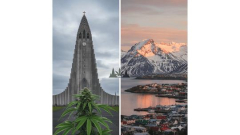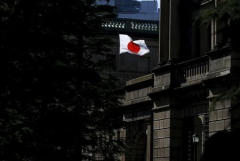Prologue: At the Edge of Everything
Some stories begin in cities of glass and noise. Mine begins in silence — the kind that only lives at the ends of the Earth.
In the fall of 2025, I found myself chasing the cannabis plant from one edge of the planet to another — from Reykjavík, Iceland, just below the Arctic Circle, to Ushuaia, Argentina, the southernmost city on Earth. Two hemispheres, two extremes, two frontiers where the air is thin, the weather unpredictable, and the culture disarmingly warm.

The Hallgrímskirkja cathedral in Reykjavik, a cannabis plant, and a scene from Ushuaia, Argentina.
Robert Hoban
It started in the north, in a nation of glaciers and geothermal fire — a place that feels both ancient and futuristic at once. There, I witnessed Iceland’s major cannabis conference, Version 3.0, Hemp for the Future, where science, culture, and courage collided under the aurora borealis. A few weeks later, I followed that same spirit south, to the windswept edge of Patagonia, to Tierra del Fuego, the legendary Land of Fire, where Argentina’s growing cannabis movement is shaping something bold and new against a backdrop of mountains and sea.
Between the poles, a simple truth revealed itself: the plant finds its people. From volcanic islands to glacial peninsulas, the same rhythms repeat — curiosity, courage, community. The cannabis conversation is no longer confined to capitals and boardrooms. It’s happening in places where the land itself tests what humans are made of.
This is a story about those places — about fire and ice, smoke and spirit, and the people at the edges of the map who are lighting the way forward.
Fire and Ice
Many people think of Iceland as the vacation of a lifetime, while others are drawn only to sun-soaked beaches. I seem to chase something else — cannabis to the ends of the Earth.
Reykjavík, Iceland’s capital — meaning “Smoky Bay” — was founded in the late 9th century by Norse settlers, named for the steam rising from the area’s geothermal springs. But don’t you tell me this town ain’t got no heart. You feel it the moment you step outside: the bite of the wind off Faxaflói Bay, the curling geothermal steam rising through the streets, and the warmth of strangers who greet you like old friends. This city hums with a quiet rhythm.
I have traveled to Iceland several times before. Iceland, I’ve found, is an amazing destination for just about anything — including cannabis. That same spirit defined Hemp for the Future 2025, a gathering unlike any other, where farmers met futurists, policy met philosophy, and the cannabis plant was treated not as a taboo but as a teacher. At the center of it all was Þórunn Þórs Jónsdóttir – who we simply know as Tóta. She is the visionary force who pulled it off with grace, grit, and a sense of purpose that would make even the most seasoned conference organizer tip their hat.
“I wanted to create a space where science, spirit, and social change could finally meet — where people could talk about cannabis openly, without fear or stigma,” Tóta told me. “What happened at IÐNÓ felt like history in motion.”
Inside the storied IÐNÓ Theatre, the air buzzed with optimism. The roster of speakers was extraordinary:
Ian Rassman, the unofficial “Mayor of Cannabis,” led a Reykjavík Cannabis Walking Tour and discussed financial services in the cannabis industry.
“In the global cannabis industry, access to banking and payments isn’t just about moving money — it’s about moving the industry forward,” he said. “Real progress means recognizing that financial services aren’t a luxury; they’re the foundation of safety, transparency, and equity. Without them, we’re not just breaking the law — we’re breaking consumer trust, public safety, and business-to-business transparency.”
Beau Whitney (of Whitney Economics) analyzed market data and emerging global trends.
“Cannabis has both medicinal and wellness applications,” Beau explained. “The global wellness industry is exploding — a $6.3 trillion global market — and $830 billion of that is associated with wellness tourism. Iceland is already a wellness destination, and canna-wellness tourism is already estimated to be a $2.0 billion industry. Cannabis could elevate that even further.”
Mariana Larrea unpacked stigma, regulatory frameworks, and pathways to legalization.
“Latin America has taught the world that legalization isn’t an event — it’s a process,” she said. “It’s not just about opening a market; it’s about opening minds. The key is to regulate with empathy and courage, not fear.”
Cynthia Salazarideh reminded us how far the industry has come, while Jamie Pearson delivered a rousing keynote, sharing her trademark blend of pragmatism and inspiration.
“The cannabis industry’s future belongs to nations courageous enough to regulate it,” Jamie said. “Courageous cannabis policy isn’t risky — it’s smart economics. Legalization drives revenue, reduces harm, and positions nations like Iceland at the forefront of wellbeing-based growth. If Iceland is brave enough to legalize cannabis — to build trust, craft regulation, and provide safe access — the plant transforms into medicine, a climate solution, and justice reform all in one.”
Dustin Hoxworth of Fat Nugs Magazine reminded everyone what this industry is really about:
“Let’s keep in mind that normalization and legalization aren’t just about policy or profits — it’s about humanity,” he said. “It’s about building a world where cannabis is as natural as conversation, where people come together not in fear, but in understanding and connection to build community and shared truth around a plant that heals.”
Rafal Modlinski spoke of hemp’s synergy with bees, Jim Pearson discussed cultivation standards, and Sara Payan brought the audience back to the human heart of it all.
“After a lifetime in the cannabis industry, I never thought I’d see the world beginning to accept the medicinal benefits this plant offers,” Pearson reflected. “But it’s happening — and Iceland has a unique chance to lead through quality, research, and renewable energy.”
“What struck me most about Iceland wasn’t just its natural beauty, but the generosity woven into its culture,” said Payan. “Whether sharing a meal or a story, people met you with genuine curiosity. It reminded me that hospitality is a kind of shared rhythm — an unspoken language.”
“When women lead,” she added, “the cannabis space expands in empathy, creativity, and balance. We carry an understanding of abundance — that success isn’t about taking more, but about creating more for everyone.”
Each speaker brought a unique lens, sparking conversations that stretched long after the sessions ended.
The Icelandic audience was electric. They weren’t passive observers; they were engaged, curious, asking sharp, informed questions. Iceland ranks among the world’s highest per-capita cannabis users, yet its laws remain among the most restrictive. The people are ready; yet the government does not seem to be paying much attention.
“The energy in that room was incredible,” Tóta said. “You could feel people waking up — not just to the plant, but to the possibilities it carries for healing, innovation, and community.”
That tension threaded through much of our conversation. Iceland’s CBD and hemp framework mirrors broader world standards — cautious, precise, restrictive. Yet hemp could be Iceland’s bridge — a renewable crop rooted in clean-energy ethos, a seed for innovation in textiles, wellness, and climate-conscious agriculture.
“Hemp is Iceland’s chance to show how innovation can be ethical, sustainable, and rooted in care for people and the planet,” Tóta told me. “We don’t need to copy others — we can lead in our own way.”
And yet, just a football-field away from the Parliament building, government officials were seemingly absent. Tóta and the organizers worked tirelessly, through local contacts, to coordinate meetings, provide resources, and share global insights on cannabis legalization and medical frameworks. Across the world, dozens of countries have embraced reform; here, the world’s leading cannabis experts gathered — literally steps from policymakers — and the doors remained closed. I am not here to critique or criticize Icelandic politics; I know little of its inne





